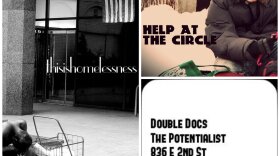We hear a lot about the problem of homelessness in downtown Reno, but we don’t always hear from the actual people who are living on the streets. Today, we join Derek Rivera to learn what a typical day is like for him. Rivera is 33, and he was homeless in a handful of other cities before landing in Reno.
This story was reported by Prince Nesta for Our Town Reno, a multimedia street reporting project run by the Reynolds School of Journalism.
Newly Homeless Again
Derek Rivera says he’s newly homeless again after dealing with family problems back on the East Coast with his older brother and mother, who both siblings depend on.
He says he didn’t agree with his mother taking his formerly jailed brother in. He had been a caretaker, cooking for his mom.
He’d been to Reno before and felt people didn’t bother him here, so he came back. He’s also had periods of homelessness in St. Louis, Missouri and Portland, Oregon, among other places, but he feels safer in the Biggest Little City.

Depending on Social Security Disability Payments Rather than Work
When on the streets, he gets by with the Social Security disability payments he’s been receiving since he was 21 for psychiatric disorders, including constant bouts with paranoia.
He once tried working in low-level jobs but he says it put him and others in danger.
“I can't work with other people because I feel like I'm I'm doing double the work,” he said. “And I'm always working around individuals who are either on drugs or alcohol. I don't want to go back to doing what I used to do... I used to take a folding knife and I used to cut my chest to prevent myself from cutting people while I was at work.”
A Typical Day Back and Forth from the Shelter
Lately he says he’s been trying to stay calm while staying at Reno’s main shelter and described a typical day:
“I get up from the men's dorm. I brush my teeth. I try to keep you know hygiene. As much as possible…I try to. I try to stay clean. After I use the restroom, I scan my card, because you have to scan your cards so that way you can keep your bed. Otherwise, the staff will cut your lock. And throw your things out. Once I'm out of the men's shelter, I go across the parking lot, to what's called the day area ... aka the pit. And I stand in line and wait until 8 o'clock. These gentlemen come in with bagels and donuts. I usually have a bagel, because I try not to have sweets. So I grab a bagel and I start to walk to the Believe (sculpture) area here between North Virginia street and Central street. And I stay here for hours until I eventually go to the downtown Reno library. And I play chess alone, although I did play with this gentleman last week. I usually play chess to improve my chess skills.”
Read the rest of this story at Our Town Reno. This story was produced by Prince Nesta, a reporter for Our Town Reno, which is a multimedia street reporting project run by the Reynolds School of Journalism.





